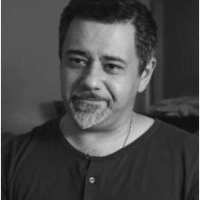Stanislavsky vs. Vakhtangov: Reconciling the Russian Theatrical Avant-Garde With Russian Orthodoxy
Andrei Malaev-Babel, Assistant Professor of Theatre, Florida State University
Overview
"The passion of theater is meant to provoke the presence of a higher being," exclaimed Andrei Malaev-Babel, Associate Professor of Theatre, Florida State University. At an 11 April 2011 Kennan Institute discussion, Malaev-Babel spoke of the relationship between the Russian Orthodox Church and Russian theatrical avant-garde, and how two ideologies address the inconsistencies of that relationship.
The Russian Orthodox Church has historically objected to the idea of the theater. Malaev-Babel cited the Church's three major charges against the theater; first, in performing, the actor "commits certain sin against God by erasing their own identity." The Church's second charge regards the degree of dishonesty in theater—that the life on stage is in fact a lie, as the speaker noted. Third, the Church objects to the elements of escapism in theater; while engaging the audience in the act of theatrical production, Malaev-Babel explained, actors allegedly lead the audience away from their true purpose of serving God.
However, according to Malaev-Babel, those involved in theater might not necessarily agree that the Church and the theater are mutually exclusive; indeed, many greats in the Russian theater scene were deeply religious people. Further, the speaker explained the two major philosophies within Russian theater that developed in response to the Church's charges against the theatrical community.
The first theatrical style Malaev-Babel described was created by Russian theatrical innovator Constantin Stanislavsky, who attempted to "justify" theater, the speaker noted, adding, "In his practice, he probably answered all of the three charges." According to Malaev-Babel, Stanislavsky believed that "an actor has to step on the stage altered, transformed, as a better human," which contradicts the notion that the actor's higher ego is erased. Moreover, the speaker added that Stanislavsky believed the godly self is the one that participates in the acting process—that the theater is a temple; the actor is a high priest.
With regards to the Church's charge of theater's dishonesty, Stanislavsky believed that "Theater will become as honest as life itself." Finally, Malaev-Babel noted that Stanislavsky's style of theatrical avant-garde effectively addressed the notion that theater promotes escapism. As Malaev-Babel described, the actor believed that "theater is, in fact, a very significant force in bringing moral, good messages to the nation. It's not meant to escape, it's meant to promote spiritual betterment."
The second theatrical philosophy Malaev-Babel cited that addressed the Church's grievances was developed by avant-garde actor, director and teacher Yevgeny Vakhtangov, whom Malaev-Babel described as the author of new forms of theater. Unlike Stanislavsky, Vakhtangov believed that the level of honesty present in the "real life" human behavior is not sufficient for the stage. He noted that in life we constantly wear masks meant to disguise our true thoughts, feelings, and our true identity; the theatrical masks of the character, however, must be used by actors in order to help them freely reveal their true inner self. With regards to the Church's first charge, Malaev-Babel noted that Vakhtangov believed that there is an ultra-honest, even "confessional level of acting—and of communion—between the audience and the ensemble of actors on stage," which does not go against God. With this type of communion, actors do not lose their identity; the transformation that takes place during this process is not a transformation into a different individual, but rather a transformation of a creative individual. In such a transformation, actors, as creative selves "become vigorous, and both their good and bad seeds express themselves with special vividness".
In response to the Church's second charge regarding dishonesty in theater, Vakhtangov asserted that "the honesty of theater has nothing to do with everyday life." Malaev-Babel added that the true mask of an actor is a creative mask that allows the actor to be more sincere, to be more honest, and to reveal— in a very confessional way— their deepest secrets. Finally, Vakhtangov's avant-garde style did not classify theater as escapism, but rather as "fantastic realism," a term originally used by Dostoevsky; indeed, Vakhtangov felt that theater is supposed to evoke the spirit of creativity. "At the heart of every thinking, moral human being, there is a festive struggle between good and bad," Malaev-Babel concluded, "and unleashing this creative festivity is the theater's ultimate goal, according to Vakhtangov."
By Amy Shannon Liedy
Blair Ruble, Director, Kennan Institute
Speaker

Hosted By

Kennan Institute
The Kennan Institute is the premier US center for advanced research on Russia and Eurasia and the oldest and largest regional program at the Woodrow Wilson International Center for Scholars. The Kennan Institute is committed to improving American understanding of Russia, Ukraine, Central Asia, the Caucasus, and the surrounding region though research and exchange. Read more
Thank you for your interest in this event. Please send any feedback or questions to our Events staff.










